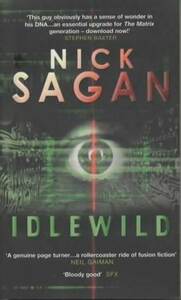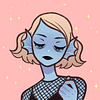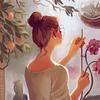Take a photo of a barcode or cover
I'd forgotten entirely whatever I'd read about this book when I finally started it, which made the disorienting opening surprisingly effective. A person wakes up, in pain and somewhat to be surprised to be alive, with complete amnesia. He slowly pieces together who and where he is, or so he thinks, but unexpected layer after layer of reality reveals itself. I haven't read any science fiction in quite some time, and this was a good reintroduction. Author Nick Sagan is the son of Carl Sagan, so I imagine I can expect his science, at least, to be convincing!
fast-paced sci-fi with a unique premise and a goth mc. this shit feeds my soul
Sarcasm. Plain, unadulterated self-loathing, nicotine addiction. None of these are good in the grand scheme of things, nor are they good for you. I love them now. Why, I hear you ask? Simple. Halloween likes them. And Halloween is the single most fascinating character I have ever read. I've never smoked in my life, but just reading Sagan's "Idlewild" makes me crave the cloves Hal is constantly lighting up. Hal is the protagonist, but he's one of the best examples of an anti-hero ever: he's sullen, intelligent, hates authority, hates everyone around him but grudgingly sticks with them, and he's confused inside. More so than usual at the beginning of "Idlewild."
My point with this rambling excuse for a review is the following: good books have characters that undergo change and act memorably. Great books have characters that are forced to change and become templates for all such future characters. This is Halloween to me. As a writer, I've tried to put a little of Hal in everything I write, from manuscripts to recipes. The occasional sarcastic snipe in a cookbook is charming and indicative of character, I believe. Ah, there we are, the magic word: Character. You, me, Dickinson, and Poe, all of us writers, all could use more character in our characters. More oomph, more of a distinguishable taste that makes them themselves. Again, to me, that's Halloween.
My point with this rambling excuse for a review is the following: good books have characters that undergo change and act memorably. Great books have characters that are forced to change and become templates for all such future characters. This is Halloween to me. As a writer, I've tried to put a little of Hal in everything I write, from manuscripts to recipes. The occasional sarcastic snipe in a cookbook is charming and indicative of character, I believe. Ah, there we are, the magic word: Character. You, me, Dickinson, and Poe, all of us writers, all could use more character in our characters. More oomph, more of a distinguishable taste that makes them themselves. Again, to me, that's Halloween.
Originally read in 2008, reread September 2017
Almost ten years ago, this book blew my mind. I thought it was so snarky and clever and the twist came out of nowhere but made so much sense. I read it in a day (which was and still is super rare for me). The morning after I completed Idlewild, I went to Barnes & Noble and purchased the rest of the trilogy. I devoured those, too.
Now, my thoughts have changed a little. Maybe it's because I'm no longer angsty, fresh out of high school and looking to point my middle finger at anyone who rubs me the wrong way.
Upon reread, I knocked off a star on my rating. The first third of this book is too melodramatic, Halloween's obsession with Simone is fucking creepy, and the antagonist's motives aren't explained at the end - leaving too much up to the reader (okay I don't mind that last one too terribly much, but I'd like a little more concrete reasons why that kid did what they did).
Still a favorite. Still really good. But just a little less so.
Almost ten years ago, this book blew my mind. I thought it was so snarky and clever and the twist came out of nowhere but made so much sense. I read it in a day (which was and still is super rare for me). The morning after I completed Idlewild, I went to Barnes & Noble and purchased the rest of the trilogy. I devoured those, too.
Now, my thoughts have changed a little. Maybe it's because I'm no longer angsty, fresh out of high school and looking to point my middle finger at anyone who rubs me the wrong way.
Upon reread, I knocked off a star on my rating. The first third of this book is too melodramatic, Halloween's obsession with Simone is fucking creepy, and the antagonist's motives aren't explained at the end - leaving too much up to the reader (okay I don't mind that last one too terribly much, but I'd like a little more concrete reasons why that kid did what they did).
Still a favorite. Still really good. But just a little less so.
Really good sci-fi book. The first few chapters were a little hard to wrap my head around, but as the story unfolded it got better. This wasn't the best book I've ever read but it wasn't a waste. I am entertaining the idea of reading the next ones in the series....
I read this book years and years ago when I was a freshman in high school. I still love it. I couldn't get into the sequels (Edenborn and Everfree) but I can read this book a million times and never get bored. It was so smart and I liked the stream-of-consciousness tone that Halloween narrates in. My friend literally handed me the book and told me to read it. So I did. And it was awesome. It's the kind of book that you shouldn't research too much before you read-discover it as you go. I can see how knowing about it ahead of time can turn some readers off. But when people ask me what to read, this is one of the books I recommend.
Idlewild is very Matrix-esque. It starts when we meet a confused young man, who appears to be in a dark sinister place, and who seems to know as little about his world as we do. It's all very confusing (for him, and for us) but also intriguing. It seems to be a chilling place on the one hand, but as things develop we see that it's actually a place of friendship and fun......until things start to go Pete Tong.
The confused young man we meet on the first page is Halloween (how cool is THAT for a name?!!) and in his little corner of the world everything is orange and black. The colours are his 'call sign' or 'gimmick' and help distinguish him from his friends who each have their own colour combo's and quirky names.
However, his circle of friends and the world as he knows it are about to become thrown into disarray and come crashing down around him. He comes to the realisation that his survival depends on what amounts to nothing more than computer pixels. He realises that his world is actually a lot smaller than he first thought. A LOT smaller.
He's not who he thought he was, his friends and teachers are not who he thought they were and his life depends on being able to work out what's real and what's not.
Confused? So was I......but it's a great confusion! I loved this book! I haven't read anything like it before and I'm so glad it's a series. I like the character Halloween a lot in this first installment and can't wait to see where he goes from here. This is a great book to lose yourself in. It's one of my favourite subjects in works of fiction; apocalyptic, end of the world scenario with a bit of plague and 'last man standing' thrown in for good measure.
I didn't realise when I read this that Nick Sagan was Carl Sagan's son (how could I NOT have known, with a name like that? Duh!), but I don't think it would have made much difference if I'd known in advance because I've never read any of his dad's books to compare with. He's a talented author and regardless of who his dad is, he's got a book here that holds up well against some of best SF writers around.
The confused young man we meet on the first page is Halloween (how cool is THAT for a name?!!) and in his little corner of the world everything is orange and black. The colours are his 'call sign' or 'gimmick' and help distinguish him from his friends who each have their own colour combo's and quirky names.
However, his circle of friends and the world as he knows it are about to become thrown into disarray and come crashing down around him. He comes to the realisation that his survival depends on what amounts to nothing more than computer pixels. He realises that his world is actually a lot smaller than he first thought. A LOT smaller.
He's not who he thought he was, his friends and teachers are not who he thought they were and his life depends on being able to work out what's real and what's not.
Confused? So was I......but it's a great confusion! I loved this book! I haven't read anything like it before and I'm so glad it's a series. I like the character Halloween a lot in this first installment and can't wait to see where he goes from here. This is a great book to lose yourself in. It's one of my favourite subjects in works of fiction; apocalyptic, end of the world scenario with a bit of plague and 'last man standing' thrown in for good measure.
I didn't realise when I read this that Nick Sagan was Carl Sagan's son (how could I NOT have known, with a name like that? Duh!), but I don't think it would have made much difference if I'd known in advance because I've never read any of his dad's books to compare with. He's a talented author and regardless of who his dad is, he's got a book here that holds up well against some of best SF writers around.
If you read the reviews in various places, this book is generally compared to a dozen well-known books and movies. It is comparable. But... it's different. The writing is well-crafted, in a way that quite a bit of sci-fi/fantasy isn't. It respects the readers with its allusions to art, literature, philosophy, history, and music. That being said, one subplot was solved, with an obviously rough cut at the end to inspire me to read on in the series.






